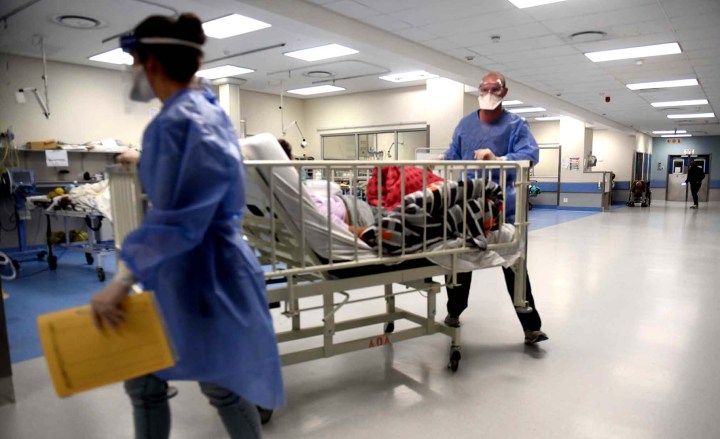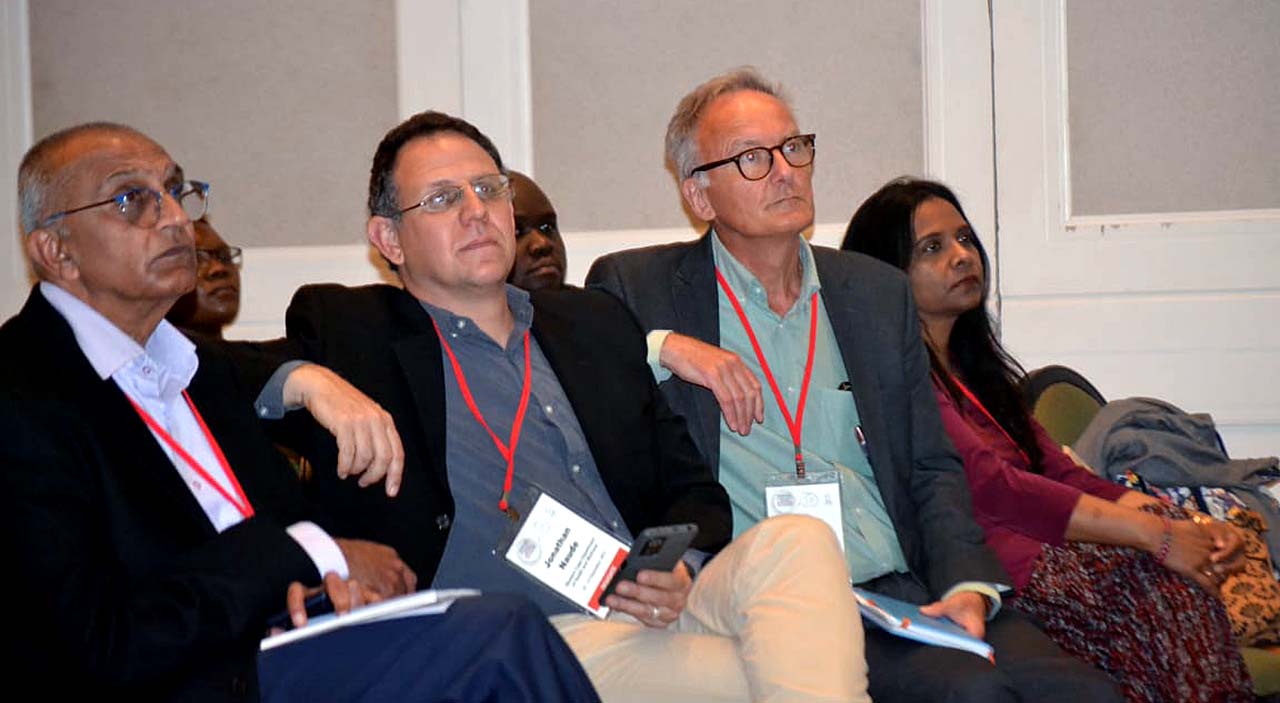SPOTLIGHT
Freezing of posts will hamstring already strained health services, conference told

With Finance Minister Enoch Godongwana expected to deliver the Medium-Term Budget Policy Statement on 1 November, the freezing of posts will further strain services, presenters at a Gqeberha public health conference warn.
The National Treasury’s cost containment letter sent to government departments instructing that posts be frozen was one of the big themes underlying talks about building healthcare worker capacity at the Public Health Association of South Africa’s (Phasa’s) conference held recently in Gqeberha.
With Finance Minister Enoch Godongwana expected to deliver the Medium-Term Budget Policy Statement on 1 November, the freezing of posts will further hamstring already strained health services, some presenters at the conference warned.

The National Treasury’s cost containment letter sent to government departments instructing, among other measures, the freezing of posts was one of the big themes in talks on building South Africa’s healthcare worker capacity at the Public Health Association of South Africa’s conference held recently in Gqeberha. (Photo: Rosetta Msimango / Spotlight)
An oversight visit to TB hospitals by members of the provincial legislature (MPLs) in the Eastern Cape from 5-8 September showed just how bad the staff shortages are. The only remaining hospital in Nelson Mandela Bay dedicated to TB services, Jose Pearson Hospital in Bethelsdorp, has had staff vacancies hovering around 20% since 2019. The hospital provides dedicated TB services to the western part of the province.
MPLs heard that in some other hospitals, vacancy rates were even higher, and the non-filling of critical posts in some cases results in further medico-legal claims against the department, as the current staff buckles under massive patient loads.
Read more in Daily Maverick: No work, full pay – why an Eastern Cape TB hospital closed and what this means for healthcare in the province
Last year, in response to a parliamentary question, the health department said there were 3,892 vacant healthcare worker posts in the province. In the nursing categories, there was a vacancy rate of 15.3%. For paramedics (EMS) the vacancy rate was 10.7%, medical practitioners 8.4% and pharmacists 13.7%. By June this year, the vacancy rate in the province had dropped to 13%.
Dr Prudence Ditlopo, a senior researcher at the University of the Witwatersrand, was presenting her research on the impact of nurse workloads and professional support on healthcare outcomes at the Phasa conference. Ditlopo said nurses already had a huge workload and budget cuts negatively affected morale.
“This is not the first time that this monotonous cycle has been happening. Yes, we understand the economic side of it, but at the very same time, what does it say about the wellbeing of the nurse practice environment, the patients, and the quality of patient care? If nurses see that they are overwhelmed by the workload, they will make sure to find ways that will enable them to cope.
“Enable them to cope” means nurses will find a way that works for them. If what works for them is only seeing 10 patients per day, they will do that and they will be gatekeepers for other patients who are coming to the facility. That alone will influence the quality and standard of care in primary care in South Africa,” Ditlopo said.
‘Will create more problems’
Dr Busisiwe Matiwane of the University of the Witwatersrand’s School of Public Health also weighed in on the implications of the Treasury letter.

From left to right: Dr Krish Vallabhjee, Dr Jonathan Naude, Prof Neil Squires and Prof Saloshini Naidoo were panellists during the session on building workforce capacity. (Photo: Luvuyo Mehlwana / Spotlight)
“In the current system, health professionals have to work for the government to fulfil their community service obligations. However, it can be challenging for them to be assigned to specific hospitals when it is time for their community service. Additionally, with the government announcing a freeze on posts, many individuals who are not government-funded may be compelled to seek employment outside of the government after completing their community service,” Matiwane told delegates.
“If these posts are indeed frozen, does that mean that the government will also halt the placement of individuals who are required to complete community service? The current structure dictates that if you fail to fulfil your community service, you will not be recognised by the statutory bodies as an independent practitioner.
“The implication of this proposal by the government will create more problems, as we already face the challenge of health professionals’ placement or their community services,” she said.
“The main concern is whether the posts will be frozen and what will be done. I think this concern has raised questions for many people, who wonder what it means if they are unable to complete their community service or the internship. Does it mean they cannot work?”
‘Protect what is already there’
Speaking on the sidelines of the three-day conference, Russell Rensburg, the director of the Rural Health Advocacy Project, said the wage agreement on a 4.5% increase for the public sector had the Treasury’s back against the wall since it had not been budgeted for in the February Budget.
“Treasury is playing hardball and the provinces must decide what they need. The national government must also decide what they need. If they follow through on this, they won’t be able to sustain the public health system.
“There is concern that doctors will leave as part of cost containment measures, and you can’t run a healthcare system without healthcare workers. But we will only know the true position of the Treasury when they publish the Medium-Term Budget Policy Statement,” Rensburg said.
“I believe at the moment they are just testing the market. They are saying we must have one thing, but we can’t have both, so that is the game they are playing. Our position is clear on this issue. Before any salary cuts or job freezes, we need to protect what is already there.
“We need to retain this year’s cohort of community service doctors, pharmacists and nurses because these people helped us during Covid-19. Some were interns during Covid-19 and they are the core that can build the health service in the post-Covid-19 era. So, the immediate priority is to retain those posts because we don’t know if there will still be community service going forward,” Rensburg said.
‘Working with what we have’
Several speakers and presenters at the conference raised concerns about the shortage of healthcare workers and urged the Department of Health to take action. The experts, academics, researchers, students, non-governmental organisations and civil society members all agreed that healthcare was a fundamental human right, but that right would not be fulfilled without healthcare workers, as there could not be health services without workers.
The government’s key policy document on human resources for health warned as far back as 2020 that the country was facing a critical shortage of healthcare workers.
Dr Krish Vallabhjee, former chief director of strategy and health support in the Western Cape Department of Health, believes that management must use whatever resources are available to achieve good results.
Read more in Daily Maverick: SA’s delivery of crucial services under threat after Treasury desperately calls for public ‘fiscal consolidation’
Vallabhjee said, “Budget cuts are a reality, so whatever we talk about here and in many of these conference sessions, we can’t be talking about wanting more and more. We need to work with what we have. How can we repurpose the people we have? Can’t we use them more effectively to achieve the same effect?
“Managers need to work with their staff instead of just sitting in some corner and making budget cut decisions. Managers need to engage with staff to address the problem of not having enough budget. How do we work together? What are our priorities?
“As managers, we must listen to what people are saying on the ground. What are the doctors, nurses, and local managers saying? We must be united. It should not be a thing that one hospital, clinic, and the district [are] fighting for their own piece. We are one department and we have this problem of a budget. How do we unite and do the best we can?”
Government will clarify
In a statement on 14 September, Minister in the Presidency Khumbudzo Ntshavheni said that Finance Minister Enoch Godongwana would clarify the cost-containment letter issued on 31 August.
“Cabinet appreciates the current fiscal constraints, which are not unique to South Africa but have resulted in a budget shortfall. Cabinet has iterated that measures to address the budget shortfall must not impact negatively on service delivery. The minister of finance will shortly issue guidelines clarifying the unintended misunderstanding arising from the cost containment letter issued on 31 August 2023.
“In addition, as part of the in-year performance review of progress in implementation priorities agreed to with ministers, the President and Deputy President will meet with individual ministers to ensure that fiscal management does not derail the agreed-to priorities.” DM
This article was published by Spotlight — health journalism in the public interest.
















 Become an Insider
Become an Insider
Place them for their community service or release them of this burden.
The simple solution is to halve the cabinet, reduce the number of deputy ministers, cut the VIP protection unit to a quarter of its size, pay elected officials realistic wages that don’t resemble telephone numbers, and badah bing, badah bang, badah boom, problem solved. I doubt if there are more than half a dozen government DGs, CEOs and other high functionaries who actually earn their salaries. But then the ANC seldom, if ever, goes for the obvious solution. Cadre deployment on steroids has created this mess, stopping it might just fix a large part of it.
Our recently qualified doctors are being forced to leave because there are simply no posts available in the public sector. Furthermore, many registrars are being trained as supernumeraries, which means that they are not in paid posts but are self-funded or being paid by other countries. We are looking at a future with no doctors and our young doctors are being trained to work in other countries (and not because they want to leave, but because they cannot work for free – although several do, so that thye can get experience to specialise)….this is a massive crisis.